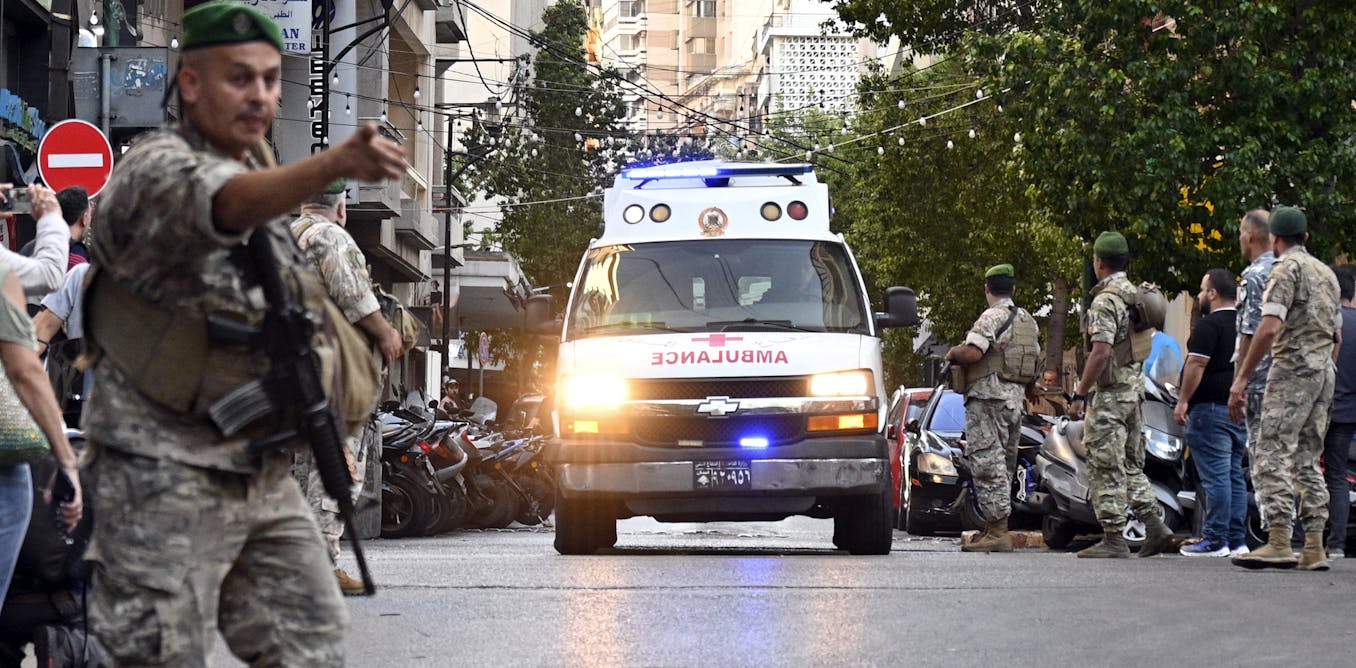
The alleged Israeli attack on members of Hezbollah via their pagers is another ominous development propelling the Middle East towards a full-scale regional war. It leaves Hezbollah with little option but to retaliate with the full support of the Iran-led “axis of resistance”.
The sophistication and impact of targeting the pagers is unprecedented. The attack resulted in at least 11 deaths, including some of Hezbollah’s fighters, and up to 3,000 people wounded.
The main aim of the attack, which US officials have reportedly said was carried out by Israel, was intended to disrupt Hezbollah’s means of communication and its command and control system in Lebanon.
Since Hezbollah has reduced the use of mobile phones by its forces because Israel can easily detect and target them, pagers have increasingly become the preferred messaging device within the group.
The attack may have also been designed to cause panic within the group and among the Lebanese public, many of whom do not support Hezbollah, given the political divisions in the country.
Since Hamas’ October 7 attacks on southern Israel, the Israeli leadership under Prime Minister Benjamin Netanyahu has repeatedly said it is determined to remove the threat of Hezbollah, which has operated in solidarity with Hamas.
Hours before the pager attack, Netanyahu’s government clarified that Israel’s war goals would expand to include a return of the tens of thousands of residents to their homes in northern Israel, which they have fled due to constant rocket fire from Hezbollah. Israel’s defence minister, Yoav Gallant, said the only way to do this was through military action.
The simultaneous pager explosions on Tuesday, then, may be a prelude to an all-out Israeli offensive against Hezbollah.
The consequences of war with Hezbollah
Hezbollah has already declared it will retaliate. What form this will take remains to be seen. The group has a massive military capability to not only to pound northern Israel with drones and missiles, but also attack other parts of the Jewish state, including heavily populated cities such as Tel Aviv.
Hezbollah showed this capability in its 2006 war with Israel. The war lasted 34 days, during which 165 Israelis were killed (121 IDF soldiers and 44 civilians) and Israel’s economy and tourist industry were markedly damaged. Hezbollah and Lebanese losses were far greater, with at least 1,100 deaths. However, the Israel Defence Forces (IDF) failed to destroy or incapacitate the group.
Any successful retaliatory attack on Israel’s cities could result in serious civilian casualties, giving Israel a further pretext to pursue its long-held aim of destroying Hezbollah and punishing its main backer, the Islamic Republic of Iran.
In a wider conflict, the United States is committed to defending Israel, while Iran would support Hezbollah in whatever way necessary. If Israeli and US leaders think Iran will continue to refrain from any action that could propel it into war with Israel and the US, they are mistaken.
Hezbollah is a central piece in the regime’s national and regional security paradigm. Tehran has invested heavily in the group, along with other regional affiliates – Iraqi militias, the Yemeni Houthis and the Syrian regime of Bashar al-Assad, in particular. The aim of this “axis of resistance” has been to build a strong deterrent against Israel and the US.
Ever since its foundation 45 years ago, the Iranian regime has viewed Israel and its main backer, the US, as an existential threat, just as Israel has regarded Iran in the same way. For this, the regime has reoriented its foreign relations towards America’s major adversaries, especially Russia and China. Russo-Iranian military cooperation has grown so strong, in fact, that Moscow will have little hesitation in backing Iran and its affiliates in any war.
Tehran is fully cognisant of Israel’s nuclear prowess. To guard against it, Iran has developed its own nuclear program to the threshold level of developing a weapon. Iranian leaders may have also gained Russia’s assurances it would help defend Iran should Israel resort to the use of its nuclear weapons.
Meanwhile, it is important to remember that after nearly a year of demolishing Gaza and devastating its inhabitants, Israel has not been able to wipe out Hamas.
Its own actions speak to this. It has constantly forced Gazans to relocate so IDF soldiers can operate in areas they had previously declared to be cleared of fighters.
The task of defeating Hezbollah and its backers would be a far greater objective to achieve. It carries the serious risk of a war that all parties have been saying that they do not want, yet all are preparing for.
The pager attack is just the latest in a string of operations that keeps imperilling any chances of a permanent Gaza ceasefire that could stabilise the region and contribute to the causes of peace rather than war.![]()
Amin Saikal, Emeritus professor of Middle Eastern and Central Asian Studies, Australian National University
This article is republished from The Conversation under a Creative Commons license.


